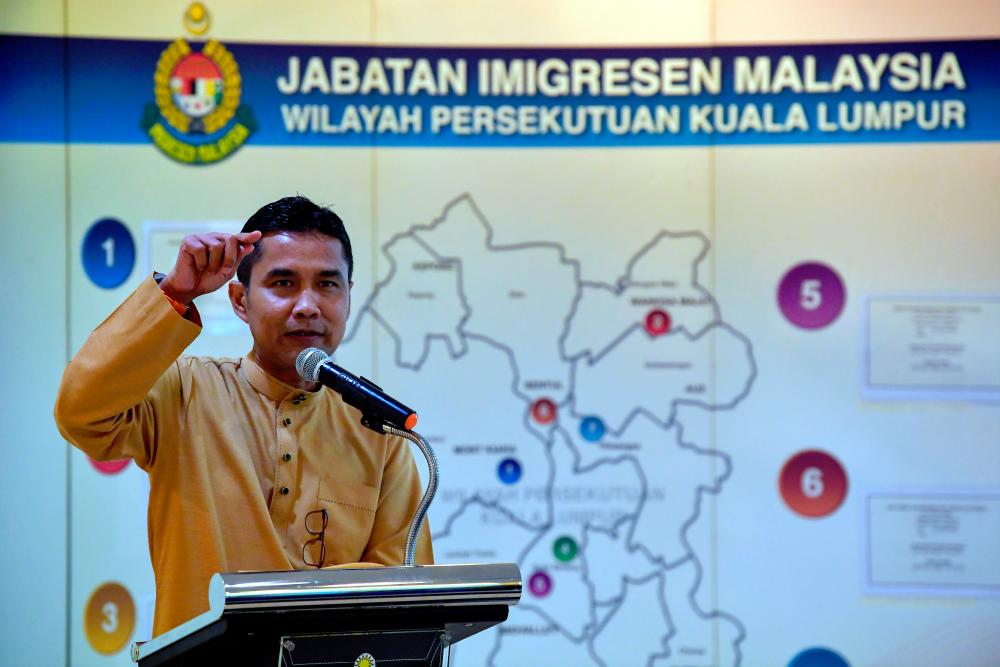PETALING JAYA: Kuala Lumpur Immigration Department director Wan Mohammed Saupee Wan Yusoff has urged the public not to give money to beggars at traffic lights and other areas.
“Doing so merely encourages more people to beg, and may even attract the involvement of syndicates. Due to beggars constantly moving from place to place, our enforcement efforts have also become more challenging.
“It has affected our ability to act on complaints as reports often lack specific details about their whereabouts,” he said.
Wan Mohammed Saupee said beggars in Kuala Lumpur can be categorised into three groups – locals, stateless individuals and foreigners, particularly Rohingya refugees with or without United Nations High Commissioner for Refugees cards.
He said each group falls under different authorities. For instance, local beggars come under the Social Welfare Department, stateless individuals may involve the National Registration or Immigration Department, and policies for foreign refugees are governed by the National Security Council.
“Various agencies, including the Health Ministry, collaborate regularly through joint operations to address homelessness, poverty, and begging in the city.
“Each agency plays a role in ensuring that roads remain safe and public order is maintained. The Immigration Department conducts patrols and follows up on complaints or tips from partner agencies to tackle the begging problem.”
Wan Mohammed Saupee said the growing number of beggars has sparked unease among the public, as their presence at traffic lights creates discomfort, and raises concerns about safety and social order.
He said the management of offences related to the issue is also divided among several authorities, depending on the nature of the violation.
“For example, road safety concerns, such as beggars walking among vehicles or causing distractions at traffic intersections, fall under the police or Road Transport Department.
“I strongly urge everyone to stop supporting beggars through direct donations or other means, as it risks perpetuating a cycle of dependence that is difficult to break.”
Grab driver Muhammad Idlan Jaafarsa, 27, said he often comes across beggars around traffic lights in Kuala Lumpur.
“Whenever I come across them, I am sympathetic to their situation, but I also recognise the risks their presence poses.
“So far, I haven’t heard of any serious road crashes involving beggars, but their actions can still put road users and the beggars themselves in danger,” he said.
However, Muhammad Idlan said their movement near vehicles in high-traffic areas creates safety concerns that cannot be ignored.
He said road users should report incidents to relevant authorities if they encounter beggars who are aggressive or pose a hazard.
“While giving alms to beggars is a noble gesture, it might encourage them and potentially hurt Malaysia’s image among tourists, who might see the issue as a sign of the country’s poverty.”
Telemarketer Muhammad Luqman Naim Adnan, 23, who commutes daily from Semenyih to Kuala Lumpur for work, said their presence seems uncontrolled.
“It is quite annoying when riding my motorcycle, which sometimes requires me to pass between cars, to find them right in front of me.
“There’s a real risk of crashing into them as they stand in the middle of the road and obstruct motorcyclists,” he said.
Muhammad Luqman Naim said in the past, he had given money to beggars, not out of generosity, but to discourage them from bothering him.
“Our country has its laws that everyone must adhere to. The authorities should increase enforcement, especially during peak hours and strengthen efforts to address the issue effectively,” he said.









